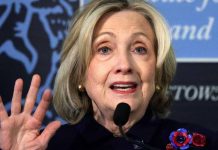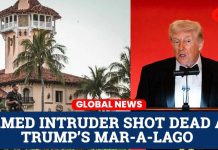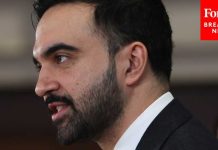
North Korea’s second-in-command just told President Trump that unless America accepts them as a nuclear power, there’s no deal—leaving the world on edge and every American wondering whether common sense or political theater will prevail.
At a Glance
- Kim Jong Un’s sister, Kim Yo Jong, issued a direct warning: the US must accept North Korea as a nuclear-armed state or forget about further negotiations.
- Trump’s outreach for renewed talks was met with a brick wall—denuclearization is now officially off the table, according to Pyongyang.
- North Korea’s nuclear arsenal has grown since Trump’s first term, while their demands have only hardened.
- This stance puts the US, South Korea, and the entire region on notice, raising fresh doubts about the effectiveness of decades of diplomatic strategy.
North Korea Draws a Nuclear Red Line, Tells Trump to Accept Reality
There’s no polite way to spin it: North Korea just slammed the door on denuclearization. This time, they didn’t send a mid-level diplomat or an anonymous official—they sent Kim Yo Jong, the regime’s most feared mouthpiece after her brother Kim Jong Un. In a statement that came down like a hammer, she declared that unless the United States formally recognizes North Korea as a nuclear state, forget about any future summits or diplomatic handshakes. All of this comes as President Trump, now back in office, has signaled he’s ready for renewed talks. The message from Pyongyang? Talk all you want, but the nuclear genie isn’t going back in the bottle.
Kim Yo Jong’s words were direct: “If the US fails to accept the changed reality and persists in the failed past, the DPRK-US meeting will remain as a ‘hope’ of the US side.” She didn’t bother with the usual diplomatic obfuscation. She made it clear that North Korea’s nuclear capability has “sharply increased” since the last time Trump and her brother locked eyes across a table. That’s not just saber-rattling; that’s a direct dare to the United States and its allies, a gauntlet thrown down in the most public way possible.
Trump’s Approach Meets North Korea’s Hardened Stance
President Trump’s previous personal diplomacy with Kim Jong Un was historic, but it didn’t move the needle on denuclearization. Now, with Trump back in the Oval Office, he’s signaling he’s open to negotiations. North Korea’s answer: unless the US recognizes them as a nuclear power, don’t even bother. The shift isn’t just rhetorical. North Korea’s nuclear and missile arsenal has grown, and they’re flaunting it with confidence. The regime is betting that the world is tired of sanctions and stalemate, and they see no reason to play by old rules that never worked in their favor anyway.
Kim Yo Jong’s rise as Pyongyang’s chief spokesperson signals a new chapter in North Korean strategy. She’s not interested in small talk or empty promises. The regime’s confidence in its deterrent is absolute. For decades, the US has stuck to a policy of “maximum pressure” and demanded denuclearization before any meaningful relief. North Korea’s answer? That playbook is obsolete. The message to Trump is clear: adapt, or get used to being sidelined while North Korea cements its nuclear status.
Regional Security on Edge and U.S. Policy at a Crossroads
This dramatic turn leaves the US, South Korea, and Japan in a precarious position. If Washington accepts North Korea’s nuclear status, it could trigger a ripple effect—regional arms races, new nuclear ambitions in Seoul or Tokyo, and the further erosion of global non-proliferation norms. But if the US holds the line, the deadlock continues, and North Korea will likely ramp up the provocations.
The stakes are enormous. North Korea’s population remains strangled by sanctions, but the regime doesn’t seem to care. Humanitarian organizations are blocked from making a real difference, while the military and defense sectors in East Asia brace for whatever comes next. For American taxpayers, this is more wasted money and more distraction from the urgent priorities at home—border security, inflation, and the endless stream of crises fueled by years of weak leadership and reckless spending. The world is watching to see whether President Trump, famous for his deal-making bravado, can cut through the decades-old fog of failed diplomacy, or whether we are doomed to more “strategic patience” and bureaucratic gridlock.
Washington’s Choices: Stand Firm or Shift Strategy?
The experts are divided, as usual. Some say it’s time to face facts—North Korea is a nuclear state, whether we like it or not, and the sooner the US adapts, the better for regional stability. Others warn that any recognition of Pyongyang’s arsenal would shatter US credibility and set a disastrous precedent. Hardliners in Congress and among America’s allies stand firmly against any concession, arguing that appeasement only rewards bad behavior. Meanwhile, Kim Yo Jong’s emergence as the face of North Korean policy is a stark reminder that the regime isn’t bluffing. The world’s patience is running out, and the next move falls to the White House.
One thing is clear: the old policies are dead. The question now is whether American resolve—and common sense—will win the day, or whether the same old D.C. games will keep us spinning our wheels while the threat grows.


















